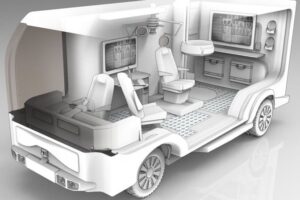How bold moves in COVID-19’s early days are powering new possibilities five years later.
The post Moving at the speed of need appeared first on Michigan Engineering News.
How bold moves in COVID-19’s early days are powering new possibilities five years later.
The post Moving at the speed of need appeared first on Michigan Engineering News.
Foundation looks to support histotripsy research at the place it was invented.
The post U-M’s Zhen Xu, histotripsy co-inventor, honored with endowed professorship from Li Ka Shing Foundation appeared first on Michigan Engineering News.
The implant attracts diseased immune cells, enabling researchers to study and target them with a nanoparticle-based treatment.
The post Multiple sclerosis: Cell-catching implant helps identify successful treatment in mice appeared first on Michigan Engineering News.

General practitioners with AI help could make diagnoses, run and interpret tests, and perform procedures like specialists.
Brain-computer interface can enable people with paralysis to socialize with others, participate in remote work and enjoy recreational activities.
The post ‘Unprecedented’ level of control allows person without use of limbs to operate virtual quadcopter appeared first on Michigan Engineering News.
U-M co-inventor of the cancer treatment has been named a National Academy of inventors fellow.
The post Histotripsy tumor treatment moves from trials to triumphs in 2024 appeared first on Michigan Engineering News.
Advanced microscopy techniques and AI models will help design complex nanoparticles for specific biological targets with less trial and error.
The post Precision health and advanced communications: €9M ($10M) for bio-inspired nanoparticles on demand appeared first on Michigan Engineering News.
New batteryless and wireless sensor tested in pigs.
The post Cancer management: Stent sensor can warn of blockages in the bile duct appeared first on Michigan Engineering News.
Some sick Black patients are likely labeled as “healthy” in AI datasets due to inequitable medical testing.
The post Accounting for bias in medical data helps prevent AI from amplifying racial disparity appeared first on Michigan Engineering News.
Capturing nanoscale ‘packages’ that cancer cells send out, twisting gold nanoparticles use light to distinguish healthy patients from lung cancer patients.
The post Faster, more sensitive lung cancer detection from a blood draw appeared first on Michigan Engineering News.